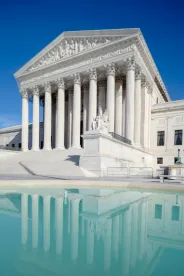On May 18, the U.S. Supreme Court announced it will hear a case to decide whether a defendant’s unaccepted settlement offer to the named plaintiffs for complete relief moots the claims of a putative class. The court’s ruling will have a dramatic impact on class action litigation. It may become easier for defendant companies to halt class action lawsuits by settling the individual claims of the named plaintiffs.
In Gomez v. Campbell-Ewald Company, Gomez sought to represent a putative class of recipients of automated and unsolicited text messages, asserting a claim under the Telephone Consumer Protection Act (TCPA), 47 U.S.C. 227(b)(1)(A)(iii). After a California district court denied Defendant’s motion to dismiss, the defendant offered Gomez a full-compensation settlement, which Gomez rejected. Defendant moved to dismiss Gomez’s claims for a second time, arguing that Gomez’s rejection of its full-compensation offer mooted his and the putative class claims. The court denied the motion.
On appeal, the Ninth Circuit also rejected the defendant’s mootness argument. The court held that an unaccepted full-compensation settlement offer to the named plaintiff did not moot the putative class claims. In doing so, the Ninth Circuit upheld its own precedent.
The specific issue before the Supreme Court is whether putative class claims become moot when the named plaintiff refuses a full-compensation settlement offer. On this issue, the Third, Fifth, and Seventh Circuits are consistent with the Ninth Circuit. The district courts of the Second Circuit and the Sixth Circuit Court of Appeals, however, follow the traditional mootness rule (that an offer to fully compensate the named plaintiff before a class is certified moots the class action).
This case is critical for businesses. If the Supreme Court reverses the Ninth Circuit and adopts the positions of the district courts of the Second Circuit and the Sixth Circuit Court of Appeals, defendants will have an effective tool to potentially avoid class actions.



 />i
/>i

